
|
Paths
of Glory (1957, UK)
In Stanley Kubrick's classic, powerfully bleak, anti-war
drama about the hypocrisy of militarism
and power - the first of his anti-war trilogy,
including Dr. Strangelove Or:... (1964) and Full
Metal Jacket (1987) and based on Humphrey
Cobb's factual 1935 novel:
- the film became an effective denouncement of self-seeking,
pitiless WWI French military leaders whose strategy and mishandling
of a failed mission were incomprehensible; in 1916, there was
horrendous trench warfare on the French front (filmed with realistic
tracking shots) against the Germans
- the opening voice-over narration set the scene
on the wartime's Western Front in France of 1916: "War began
between Germany and France on August 3, 1914. Five weeks later,
the German army had smashed its way to within 18 miles of Paris.
There the battered French miraculously rallied their forces at
the Marne River, and in a series of unexpected counterattacks,
drove the Germans back. The Front was stabilized and shortly afterward
developed into a continuous line of heavily fortified trenches
zigzagging their way five hundred miles from the English Channel
to the Swiss frontier. By 1916, after two grisly years of trench
warfare, the battle lines had changed very little. Successful attacks
were measured in hundreds of yards - and paid for in lives by hundreds
of thousands"
- a devastating suicidal attack was
planned on the impregnable "Ant Hill" - a German fortified
enemy stronghold, ordered by vain, scar-faced divisional French
General Paul Mireau (George Macready), and backed up by Corps Commander
General George Broulard (Adolphe Menjou) - a wily, cultivated but
calloused, evil, scheming and ruthless officer in the French High
Command, who had commandeered a grand, stately, palatial chateau
as his headquarters; Mireau callously predicted that 35% of the
men would die in the assault on the "Ant Hill" (leaving "enough
men to keep it")
|
The Suicidal Attack on the "Ant Hill"
|

General Broulard (Adolphe Menjou)
|

General Mireau's (George Macready) Visit to the
Trenches
|

Colonel Dax (Kirk Douglas) with Mireau
|

|
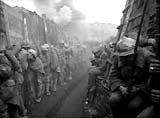
|

|
|
The Horrors of Trench Warfare
|
- there was an endless, absorbing and dramatic tracking
shot of Mireau uncomfortably walking through the muddy trenches,
speaking to various soldiers, along with distant sounds of exploding
mortars, on his way to meet with 701st Infantry Regimental Commander
Colonel Dax (Kirk Douglas) and pass on the responsibility for his
foolish strategy
- in a memorable, lengthy, tense, one-take shot sequence
(about 65 seconds in length), Dax strode solemnly through the
center of the narrow trenches with bombs blasting on every side;
the soldiers were readied with fixed bayonets to go over the top
for the assault; Dax climbed a ladder, crouched, ready with a pistol
in one hand, and after a countdown on his watch, he blew a whistle
to signal his men to charge over the top of the trenches toward the Ant Hill
- in the stunning choreographed, ten-minute sequence
of the disastrous failed attack on the Ant Hill, hundreds of
soldiers were slaughtered by machine-gun fire in no man's land -
as Mireau called out: "Miserable cowards, they're not advancing...they're
still in the trenches!"; when they predictably failed in the
ill-conceived attack, Mireau angrily commanded his own artillery,
led by Captain Rousseau (John Stein) to fire on the 'cowardly' troops
- the three scapegoated soldiers randomly selected to
take the blame were:
- Private Ferol (Timothy Carey)
- Corporal Paris
(Ralph Meeker)
- Private Arnaud (Joseph Turkel)
- the blameless men were held responsible for the stupid blunders of the commanders,
and court-martialed for "cowardice in the face of the enemy";
military commander and dissenting Army lawyer Colonel Dax, aware of the disgraceful cover-up and
episode, volunteered to defend the condemned men
- during the taut and compelling court-martial trial
sequence, held in the clean, gleaming, high-ceilinged ballroom of
the luxurious chateau, the prosecutor argued for a guilty verdict
for the condemned men: "And I submit that attack was a stain
on the flag of France, a blot on the honor of every man, woman, and
child in the French nation. It is to us that the sad, distressing,
repellent duty falls, gentlemen. I ask this court to find the accused
guilty..", while Dax argued for their acquittal: "Gentlemen of the court, to
find these men guilty will be a crime to haunt each of you to the
day you die. I can't believe that the noblest impulse in man, his
compassion for another, can be completely dead here. Therefore, I
humbly beg you to show mercy to these men"
- during the sham court-martial trial, there were
no prosecution witnesses, no indictment, and no stenographic record
of the very unfair proceedings; after an unsuccessful yet eloquent
defense by Colonel Dax, he claimed that the trial was a farce
("a mockery of all human justice")
- during incarceration, the condemned men were brought
their last meal - Ferol thought of escape, while Arnaud put his faith
in Colonel Dax - possibly for a last-minute reprieve, and Paris wondered
if they had friends among the guards; Corporal Paris spotted a cockroach: "See
that cockroach? Tomorrow morning we'll be dead and it'll be alive.
It will have more contact with my wife and child than I will. I'll
be nothing, and it'll be alive"; Ferol crushed the cockroach
with his fist and added: "Now you've got the edge on him"
- in the dawn scene at 7 am, the prisoners facing
a firing squad-execution - Arnaud was strapped unconscious on a stretcher,
Ferol continued to pray and kneel with a priest, and Paris was soberly
silent and looked stoically resigned to his fate; inconsolable, Ferol
whined, sobbed, moaned, clutched his rosary, and hung on to the priest,
asking: "What do I have to die for, Father?...I'm scared, I'm scared"
- in the tense, 7-minute firing squad scene, drums
monotonously sounded in the background as the prisoners were marched
between lines of soldiers to the open area near the chateau, where
three stakes were set up; the men were tied to the stakes, and Lieutenant
Roget (Wayne Morris) offered them blindfolds; caskets waited in an
open cart to the side; the firing squad raised its weapons (the ominous
drum roll stopped), readied, aimed (with the commands: "Ready,
Aim") - birds twittered - and then fired at the command to "Fire" -
filmed subjectively from behind the firing squad; the victims momentarily
twitched and then collapsed dead
- following the executions, Mireau was removed from
command by Broulard, and the command job was offered to Dax - who
refused to accept; during the scene of Dax's post-firing squad meeting
with the evil General Broulard, he staunchly refused a self-serving
promotion, and was then forced to apologize to the commander - but
refused to do so: "I apologize for not being entirely
honest with you. I apologize for not revealing my true feelings. I apologize, sir, for not telling
you sooner that you're a degenerate, sadistic old man. AND YOU CAN
GO TO HELL BEFORE I APOLOGIZE TO YOU NOW OR EVER AGAIN"; Broulard
innocently appealed: "Wherein have I done wrong?" - Dax
gasped and replied bluntly and quietly: "Because you don't know
the answer to that question, I pity you"
- in the final tavern scene, a frightened, fragile,
teary-eyed and innocent German blonde girl (Susanne Christian in
the credits, actually Christiane Harlan, director Kubrick's future
third and last wife) who had been captured was forced to sing
a well-known German ballad for a group of Dax's French soldiers -
a folk song of love in war, called "The Faithful Soldier"; the
looks on their faces at first humiliated her, and then softened,
as they listened empathically and understood her pain; the song evoked
memories of their youth, their homes, and their loves in a world
they might never see again

|
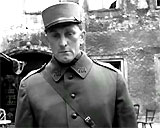
|
|
Dax: "Well, give the men a few
minutes more, Sergeant"
|
- in the film's conclusion, Dax was outside the tavern,
where he was watching and listening impassively; he received orders
from Broulard to immediately return his unit to the front's trenches;
to give his men the "short" rest they were promised but
never fully received following the assault on Ant Hill, Dax replied,
with the film's last line, that the deployment would be postponed
for a few more minutes: "Well, give the men a few minutes more,
Sergeant"; then, he walked off as the sound of drums and
military music playing the "Soldier
Boy" song rose in volume and drowned out the sound of the folk song
|

On the Western Front in 1916
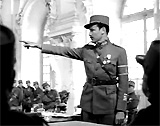

The Court-Martial Courtroom Trial
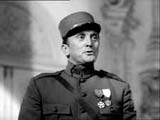

Colonel Dax's Defense of the Three Scapegoated Men

The Prisoners' Last Meal

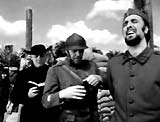
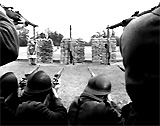
Devastating Firing Squad Sequence

Dax's Post-Firing Squad Meeting with General Broulard
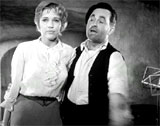
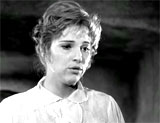
Blonde German Girl Singing in Tavern
|













